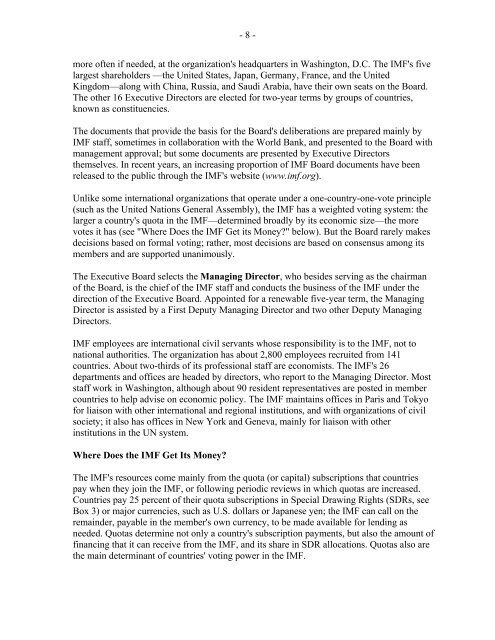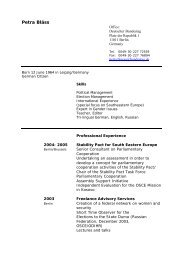What Is the International Monetary Fund? - the JVI eCampus!
What Is the International Monetary Fund? - the JVI eCampus!
What Is the International Monetary Fund? - the JVI eCampus!
You also want an ePaper? Increase the reach of your titles
YUMPU automatically turns print PDFs into web optimized ePapers that Google loves.
- 8 -<br />
more often if needed, at <strong>the</strong> organization's headquarters in Washington, D.C. The IMF's five<br />
largest shareholders —<strong>the</strong> United States, Japan, Germany, France, and <strong>the</strong> United<br />
Kingdom—along with China, Russia, and Saudi Arabia, have <strong>the</strong>ir own seats on <strong>the</strong> Board.<br />
The o<strong>the</strong>r 16 Executive Directors are elected for two-year terms by groups of countries,<br />
known as constituencies.<br />
The documents that provide <strong>the</strong> basis for <strong>the</strong> Board's deliberations are prepared mainly by<br />
IMF staff, sometimes in collaboration with <strong>the</strong> World Bank, and presented to <strong>the</strong> Board with<br />
management approval; but some documents are presented by Executive Directors<br />
<strong>the</strong>mselves. In recent years, an increasing proportion of IMF Board documents have been<br />
released to <strong>the</strong> public through <strong>the</strong> IMF's website (www.imf.org).<br />
Unlike some international organizations that operate under a one-country-one-vote principle<br />
(such as <strong>the</strong> United Nations General Assembly), <strong>the</strong> IMF has a weighted voting system: <strong>the</strong><br />
larger a country's quota in <strong>the</strong> IMF—determined broadly by its economic size—<strong>the</strong> more<br />
votes it has (see "Where Does <strong>the</strong> IMF Get its Money?" below). But <strong>the</strong> Board rarely makes<br />
decisions based on formal voting; ra<strong>the</strong>r, most decisions are based on consensus among its<br />
members and are supported unanimously.<br />
The Executive Board selects <strong>the</strong> Managing Director, who besides serving as <strong>the</strong> chairman<br />
of <strong>the</strong> Board, is <strong>the</strong> chief of <strong>the</strong> IMF staff and conducts <strong>the</strong> business of <strong>the</strong> IMF under <strong>the</strong><br />
direction of <strong>the</strong> Executive Board. Appointed for a renewable five-year term, <strong>the</strong> Managing<br />
Director is assisted by a First Deputy Managing Director and two o<strong>the</strong>r Deputy Managing<br />
Directors.<br />
IMF employees are international civil servants whose responsibility is to <strong>the</strong> IMF, not to<br />
national authorities. The organization has about 2,800 employees recruited from 141<br />
countries. About two-thirds of its professional staff are economists. The IMF's 26<br />
departments and offices are headed by directors, who report to <strong>the</strong> Managing Director. Most<br />
staff work in Washington, although about 90 resident representatives are posted in member<br />
countries to help advise on economic policy. The IMF maintains offices in Paris and Tokyo<br />
for liaison with o<strong>the</strong>r international and regional institutions, and with organizations of civil<br />
society; it also has offices in New York and Geneva, mainly for liaison with o<strong>the</strong>r<br />
institutions in <strong>the</strong> UN system.<br />
Where Does <strong>the</strong> IMF Get Its Money?<br />
The IMF's resources come mainly from <strong>the</strong> quota (or capital) subscriptions that countries<br />
pay when <strong>the</strong>y join <strong>the</strong> IMF, or following periodic reviews in which quotas are increased.<br />
Countries pay 25 percent of <strong>the</strong>ir quota subscriptions in Special Drawing Rights (SDRs, see<br />
Box 3) or major currencies, such as U.S. dollars or Japanese yen; <strong>the</strong> IMF can call on <strong>the</strong><br />
remainder, payable in <strong>the</strong> member's own currency, to be made available for lending as<br />
needed. Quotas determine not only a country's subscription payments, but also <strong>the</strong> amount of<br />
financing that it can receive from <strong>the</strong> IMF, and its share in SDR allocations. Quotas also are<br />
<strong>the</strong> main determinant of countries' voting power in <strong>the</strong> IMF.



